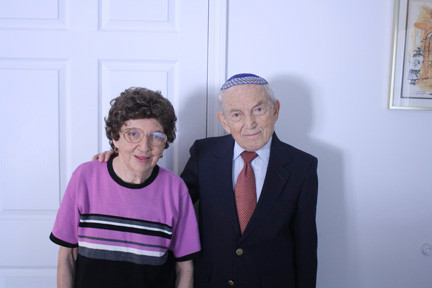Oceanside Jewish Center honors longtime cantor
Lefkovitz and his wife recognized for 40 years of service
Later this month, the Oceanside Jewish Center will be honoring its former cantor, Yitzhak Lefkovitz, and his wife Ahuva, not only for their decades of service to the synagogue, but also for the contributions they made to history.
Yitzhak and Ahuva Lefkovitz both fought in the Israeli War of Independence in 1948. While Lefkovitzs fought in the army, Ahuva was a member of the Israeli resistance, which she joined with her friends.
Ahuva’s contribution to the fight was part of the book “The Shofars of the Revolt,” which was published in Israel. Under British rule at the time, the blowing of the shofar during the High Holy Days was not permitted. Ahuva helped to smuggle a shofar to the Western Wall to be blown on the holiday.
“The British were very strict, so if you were caught they put you in jail,” said Ahuva. “I had to get the shofar and give it to one of the men who will blow it.” She received the horn from a young man and disappeared into the crowd. From there, she managed to sneak the shofar to the man who was supposed to blow it, helping the Israelis to declare their independence and show just how important their religion was.
The Lefkovitzs emigrated from Israel in 1961 to Freehold, N.J. There, Lefkovitz was a cantor at a local synagogue. They left Israel after much deliberation. Lefkovitz was trying to make a life there, but he just couldn’t make enough money.
“Having friends who … came to America and obtained positions [in synagogues], they bombarded me with letters,” said Lefkovitz. “Finally, I gave in. I didn’t want to in the beginning. I said, maybe I can make it. But the salaries were meager in Israel.”
The job as cantor in Freehold was a position that Lefkovitz wouldn’t have been able to obtain in Israel, where cantors were usually not paid positions. In addition to being cantor, Lefkovitz also worked in the synagogue’s schul, putting to use the knowledge he acquired when he attended the SELA seminary in Israel.
“I would say Cantor Lefkovitz’s education far exceeds that of some rabbis that I know,” said OJC Rabbi Mark Greenspan. “He wouldn’t say that, but his knowledge of Jewish text and the Talmud far exceeds what most of us as rabbis know. He could have easily been a rabbi, but chose not to.”
The reason Lefkovitz chose not to be a rabbi, he said, was his love of singing. “I could express my feelings far better when I sang,” he said. “And you can express feelings when you teach. But emotionally, singing gives you a better feeling. For me, at least.”
His singing was what got Lefkovitz the position at the Oceanside Jewish Center. After he had been cantoring in Freehold for a few years, he was scouted by members of the congregation at the OJC, who were looking for a new cantor for their synagogue. They came to Freehold at the recommendation of an assistant rabbi at the OJC who was working temporarily at the synagogue in Freehold.
So in 1969, Lefkovitz and his wife, along with their children Leah, Zvi and Moshe, moved to Oceanside and started working at the OJC as a cantor. Lefkovitz also taught bar and bat mitzvahs at the OJC, teaching many children every year.
“There were about 10 years we were on the peak, and there were 120 bar mitzvahs [a year], but there was another person who also taught,” said Lefkovitz. “The most important thing I can pride myself on is that all my students did to the best of their ability. And I wasn’t embarrassed with any of them. Because it’s very embarrassing when you teach a kid for a while and then someone says, ‘Oh, this kid is lousy. Who taught them?’”
Ahuva also worked at the synagogue, teaching Hebrew lessons at the OJC as well as at the former Temple Emanuel in Lynbrook.
Lefkovitz has been retired for many years, but he still works at the OJC. He helps out where he can and still does private studies with Greenspan.
The Lefkovitzs are being recognized at a special breakfast at the Oceanside Jewish Center on Oct. 28 to honor their years of service. Anyone in the community is welcome to attend.
“Adults now, when they come back to the synagogue, the first person they go to is Cantor Lefkowitz,” said Greenspan. “Because he developed a very personal relationship with all those kids. He was interested in what they were interested in. He knew how to get them involved and make them feel important.”

 63.0°,
A Few Clouds and Breezy
63.0°,
A Few Clouds and Breezy 




